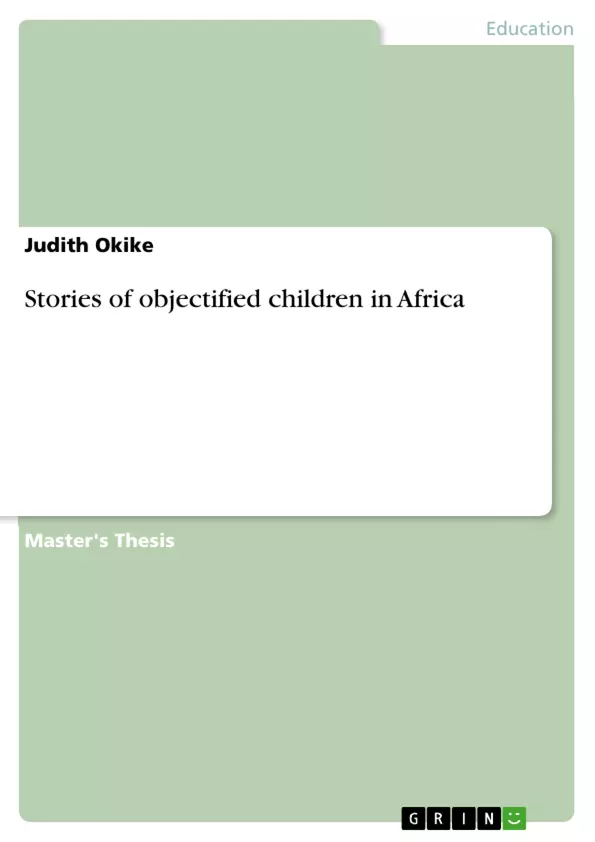The west African nation of Nigeria has over the years recorded cases of children in the context of child labor being objectified, an act that is largely perpetrated but ironically not well known because it happens behind closed doors of the employer’s home. This study goes beyond the dominant discourse on child labor to add to the existing literature by exploring and revealing the features and elements of child objectification that are underestimated in previous literature and in the world.
The researcher undertakes to listen to the stories of victims of child objectification and attempts suggestions on how to limit it. The objective of this study is to illustrates the phenomenon of family background as the trigger for child objectification in Nigeria, discuss the ordeal of the objectified children in Nigeria and Explore expectation for a better future as a precondition of continuation of child objectification in Nigeria.
Drawing from the social constructivist framework and grounded theory of qualitative research, the findings from the data narrated by the objectified victims disclosed the ordeal they went through. They were used and exploited, abused and their basic human rights violated. The experience of these children fell short of expectations: They worked like machines, were confined to their employer’s home with little or no channel of no communication with their families and friends, they were generally maltreated.
Despite the efforts by the Nigerian government together with some Non-Governmental Organizations to put an end to these human rights abuse against these minors, the practice seems to go on with most being silently committed. From the confessions of the victims, it is thought that the place of social work in Nigeria is primordial in tackling this crisis and bringing an end to child objectification. It concludes with recommendation aim at programmes and policies to inspire thoughts about these objectified children not only as topics of concern, but as valuable social actors with needs and goals.
Inhaltsverzeichnis (Table of Contents)
- Introduction
- Social Construction of Childhood
- Global perception
- The cultural perception of a child within the African context.
- The Nature of Child Objectification
- Child objectification context in Nigeria
- Measures against child exploitation in Nigeria
- United Nations convention on the rights of the child
- Methodology of the study
- Research methodology
- Data collection and process of analysis
- Ethical Compliance of the research
- Data analysis of the study
- Family Background and motive for objectification
- Ordeal of children being objectified during their childhood in Nigeria
- Optimism and Hope of person being objectified
- Discussion
Zielsetzung und Themenschwerpunkte (Objectives and Key Themes)
The primary objective of this study is to explore the phenomenon of child objectification in Nigeria, specifically within the context of domestic service. The researcher aims to uncover the experiences of children who have been objectified, highlighting the factors leading to this exploitation and the lasting impact on their lives. The study also seeks to analyze the potential role of social workers in addressing this issue and proposing solutions to improve the situation of these children.
- The social construction of childhood in Nigeria and its influence on the understanding and treatment of children in domestic service.
- The specific forms and manifestations of child objectification within Nigerian households.
- The experiences of children subjected to objectification, including their physical and psychological well-being.
- The role of social work in addressing child objectification and advocating for the rights of these children.
- Exploring the potential for positive change and a better future for children who have been objectified.
Zusammenfassung der Kapitel (Chapter Summaries)
The introductory chapter sets the stage for the study, exploring the pervasive issue of child objectification in Africa, particularly in Nigeria. It delves into the cultural and societal factors contributing to the exploitation of children within domestic settings. The chapter also establishes the importance of understanding the perspectives and experiences of the victims of child objectification.
Chapter 1 focuses on the social construction of childhood, examining global and culturally-specific perspectives on the role and status of children. It explores how societal views of childhood shape the way children are treated, highlighting the differences and similarities between global and African contexts.
Chapter 2 delves into the specific nature of child objectification in Nigeria. It examines the various contexts in which this phenomenon occurs, highlighting the practices and attitudes that contribute to the exploitation of children. The chapter also explores existing measures aimed at protecting children from exploitation, including the role of the United Nations Convention on the Rights of the Child.
Chapter 3 outlines the methodology employed in the study, including the research approach, data collection methods, and ethical considerations. It explains the framework and processes used to gather and analyze the experiences of children who have been objectified.
Chapter 4 presents the findings of the study, based on data analysis of the narratives shared by the victims of child objectification. It explores the factors that contributed to their exploitation, the experiences they endured, and their hopes for the future. The chapter also provides insights into the psychological impact of child objectification on their lives.
Schlüsselwörter (Keywords)
The main keywords and focus topics of this study include child objectification, domestic service, child labor, social construction of childhood, Nigeria, human rights, social work, child abuse, exploitation, cultural context, and qualitative research.
- Citation du texte
- Judith Okike (Auteur), 2021, Stories of objectified children in Africa, Munich, GRIN Verlag, https://www.grin.com/document/1457889



